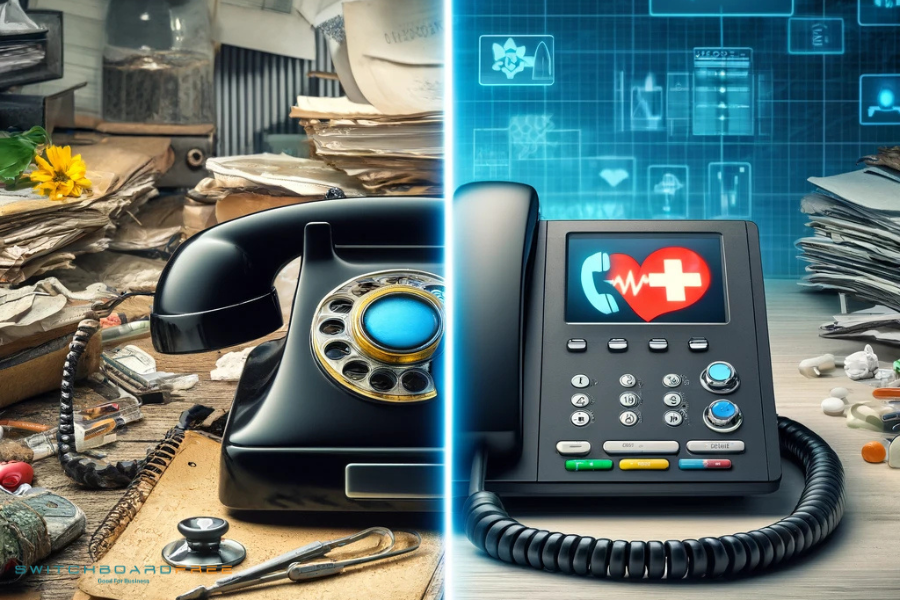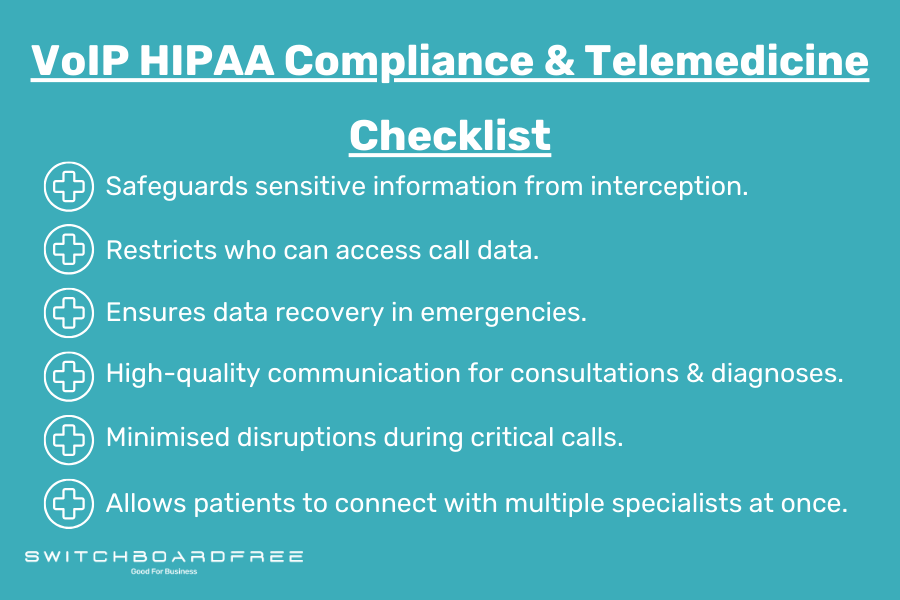VoIP for Healthcare: Easy, Secure & Efficient Communication Tool
VoIP (Voice over Internet Protocol) is undoubtedly transforming healthcare communication. By using internet-based systems, healthcare professionals can not only enhance collaboration, but streamline telemedicine practices, and enable secure remote patient monitoring. In an industry where security and compliance are critical, VoIP provides HIPAA-compliant solutions, ensuring patient data stays private while boosting operational efficiency. Moreover, with the rise of telemedicine and connected health devices, adopting VoIP is no longer optional for healthcare organisations—it’s essential.

The importance of VoIP in healthcare
Challenges in traditional systems
Healthcare communication has long relied on outdated systems, such as analogue phones and paper-based records. Consequently, these systems can often lead to missed calls, communication delays, and unsecure information sharing.
Moreover, for larger hospitals and healthcare networks, managing communication between departments and external providers becomes even more complex. However, VoIP can solve these challenges by offering:
- Cost-efficiency: Lower call charges and minimal hardware costs.
- Scalability: Easily expand your system as your organisation grows.
- Reliability: Consistent, high-quality connections for critical communications.
Improving internal communication
VoIP allows healthcare teams to use integrated platforms for voice, video, and instant messaging. As a result, this speeds up communication between doctors, nurses, and administrative staff, which in turn improves patient outcomes.
For example, a hospital can implement a VoIP-based paging system, allowing nurses to instantly alert doctors during emergencies.

HIPAA-compliant VoIP solutions
Why is HIPAA compliance critical?
Healthcare providers manage sensitive patient data daily. Therefore, to protect this data from breaches or unauthorised access, HIPAA regulations are essential. Furthermore, VoIP systems that comply with HIPAA standards guarantees:
- Data encryption during calls and storage.
- Secure user authentication.
- Protected call recordings and access logs.
How VoIP meets these needs
VoIP providers offering healthcare solutions include built-in compliance features, such as:
- Encrypted Communication: Safeguards sensitive information from interception.
- Access Control: Restricts who can access call data.
- Secure Backup Systems: Ensures data recovery in emergencies.
To clarify, this is where SwitchboardFREE excels, by offering robust, HIPAA-compliant tools tailored to healthcare. For example, secure teleconferencing for team meetings and encrypted video consultations ensures compliance every step of the way.
VoIP & telemedicine
Enhancing patient access
Telemedicine is revolutionising healthcare by enabling patients to consult doctors from the comfort of their homes. So VoIP plays a key role by facilitating:
- Seamless video calls: High-quality communication for consultations and diagnoses.
- Reliable connections: Minimised disruptions during critical calls.
- Multi-party conferencing: Allows patients to connect with multiple specialists at once.

Real-world application
For example, a rural clinic using VoIP can connect patients to specialists in urban hospitals via video. This increases access to care while lowering travel costs for patients.
Additionally, telemedicine platforms that integrate VoIP systems also enable automated follow-up reminders and appointment scheduling, further improving patient convenience.
Enabling remote patient monitoring with VoIP
What is remote patient monitoring?
Remote patient monitoring (RPM) uses connected devices to track patient health metrics, such as blood pressure or glucose levels. Furthermore, this data is sent to healthcare providers in real-time, allowing early intervention if necessary.
VoIP’s role in RPM
VoIP systems integrate smoothly with RPM devices, so ensures seamless data transmission and communication between patients and providers. For example:
- Doctors can receive alerts for abnormal readings and then call patients immediately.
- Nurses can follow up with patients by using VoIP-based video calls therefore replicating face-to-face appointments.
- AI-driven analytics, integrated with VoIP platforms, can flag critical issues and as a result ensure timely intervention.
For instance, a patient with diabetes can use an RPM device to track blood sugar levels. Subsequently, VoIP ensures that this data reaches their doctor promptly, enabling immediate action if needed.

How to choose the best VoIP system for healthcare
Choosing a VoIP system can be overwhelming. So, here’s a checklist to guide healthcare providers:
| Feature | Why It Matters |
|---|---|
| HIPAA Compliance | Ensures patient data security and legal adherence. |
| Reliability | Minimizes downtime, which is critical for patient care. |
| Cost-Efficiency | Reduces operational costs without sacrificing quality. |
| Scalability | Adapts your practice or hospital’s growth. |
| Integration Capabilities | Seamlessly integrates with telemedicine and patient monitoring systems. |
SwitchboardFREE ticks all these boxes, offering tailored VoIP solutions that prioritise security, efficiency, and affordability.
FAQs
Which VoIP is HIPAA compliant?
VoIP providers like SwitchboardFREE offer HIPAA-compliant systems with encrypted communication and secure data handling.
What is VoIP used for in healthcare?
Specifically, VoIP facilitates secure internal communication, telemedicine consultations, remote patient monitoring, and collaboration between healthcare teams.
Can small clinics use VoIP effectively?
Absolutely, VoIP systems are scalable making them ideal for small clinics looking to improve communication without high costs.
Is VoIP suitable for large hospitals?
Without a doubt. VoIP’s scalability and integration features make it perfect for large hospitals managing complex communication networks.
Conclusion
In summary, adopting VoIP in healthcare is a game-changer. It streamlines communication, supports telemedicine, and ensures HIPAA-compliant patient data handling. From reducing costs to improving patient care, VoIP is transforming the medical field, reducing costs and improving patient care.
Ready to upgrade your healthcare communication? Contact SwitchboardFREE today for tailored, secure VoIP solutions.